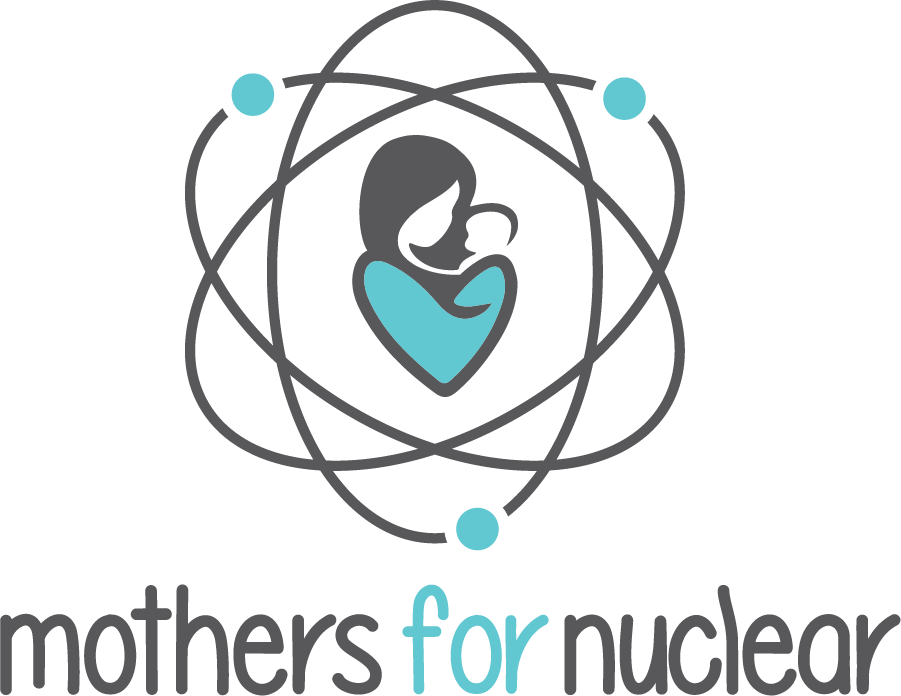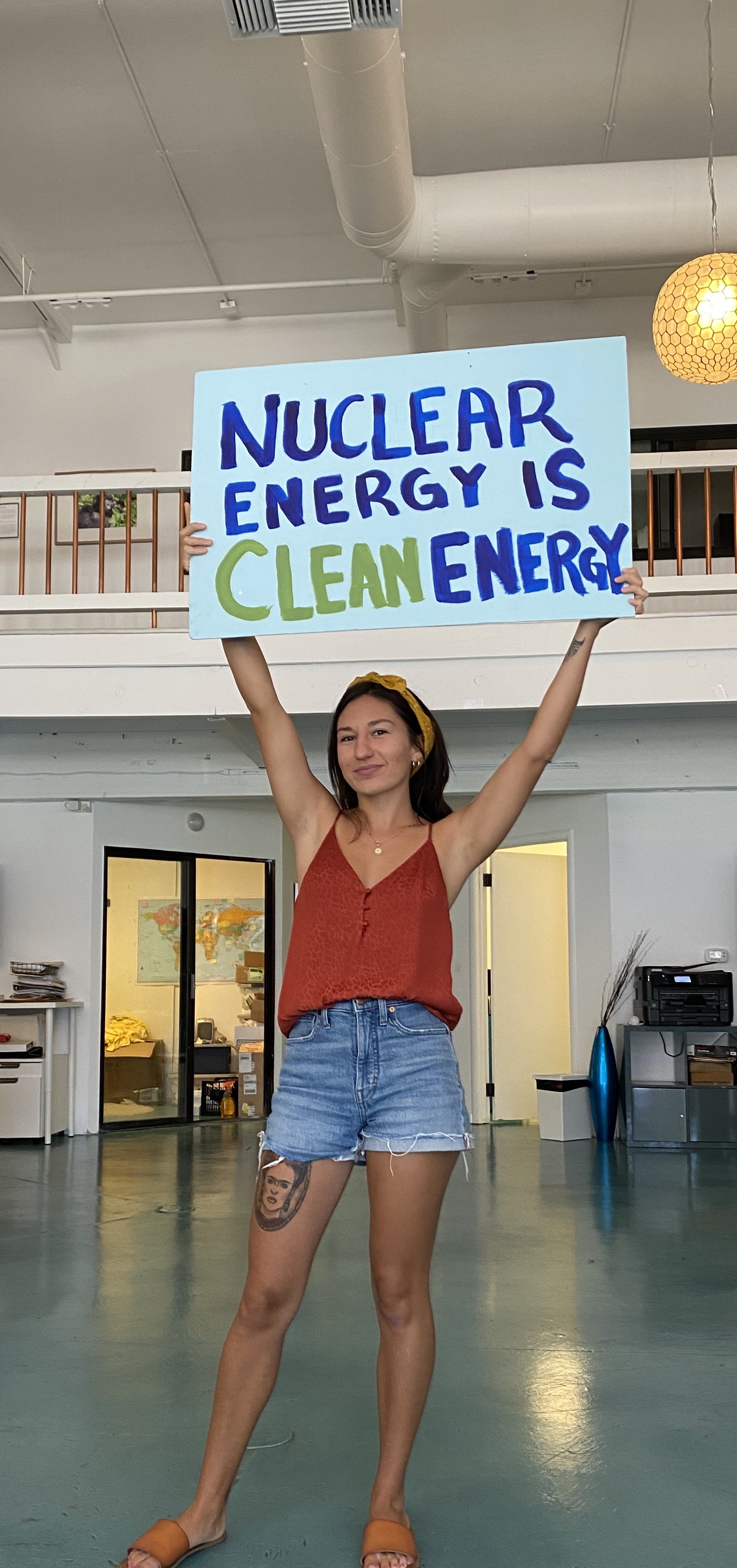Paris Ortiz-Wines
As I write my nuclear story, I never thought I would be in a career that involved me talking about a technical/science topic. Growing up, I dreamed of becoming a fashion designer, a baker, an event planner, or even a dog trainer—something creative.
I grew up in the small beach town of Santa Barbara, California. My mother, a first-generation Mexican American, and my dad, an American East Coaster, raised my four siblings and me to be conscious of our consumption: During drought, which is often in California, my mother would collect shower water to water the plants and tell us to turn off the water while brushing our teeth and washing the dishes. In summer, we would hang our clothing on drying racks rather than use the dryer. Always taught to be cognizant of our consumption, we were scolded if we left any lights on around the house.
These lifestyle habits were common among my cousins and friends of similar economic status because our parents grew up with very little and understood that making things last was just something you needed to do to get by. My cousins and I would joke about how you could never trust that there was butter in its container in the fridge because it was reused and usually had beans inside.
As I entered adulthood, I obsessively pursued efficiency and reduced my waste and consumption by eliminating food waste in my fridge, recycling, and reducing my shower time to save water. It wasn’t until I entered college that I realized this way of living was romanticized as sustainable by many environmentalists.
In my environmental studies class at Santa Barbara City College, I first learned about climate change and humanity’s ongoing environmental impacts on the earth—it terrified me. It was after this class that I committed myself to pursuing a career that focused on fighting global warming. I had decided that I was either going to pursue environmental studies or landscape architecture/permaculture.
At City College, I immersed myself in a multitude of aspects of sustainability, launching an eco-beauty campaign with a group of us students providing educational materials about the harmful and unregulated ingredients in beauty products. As a result, I eventually started making my own natural shampoo, conditioner, and deodorant with simple ingredients.
UC Santa Cruz campus.
After three years at City College, I was accepted into the Environmental Studies and Science Bachelor Program at the University of Santa Cruz. During my two years at UC Santa Cruz, I underwent an awakening - I became vegan, joined the Environmental Club as a sustainable building intern, received an internship on a permaculture farm, and got involved in political advocacy. Upon graduation, I planned to get a job at an environmental non-profit.
As such, when my partner, now my husband, moved from Santa Cruz to Berkeley, I applied to non-profit organizations, including the Sierra Club, the NRDC, and Earth Justice. I had many ideas of how I could help our environment and believed starting at a large, well-known environmental organization would help me hone in on my specialty. During this job search, I received an offer from a small nonprofit organization called Environmental Progress. This non-profit’s mission was “Nature and Prosperity for all,” a statement I fully agreed with. However, unlike the other places I had applied, this non-profit placed nuclear energy in a prominent position as the key solution to climate change and poverty.
During my time at school, I had only heard nuclear energy mentioned once in a class—the class focused on waste as an issue for the industry. I remembered that some people wanted to send it into space.
But luckily, as a millennial, I did not have emotional baggage when it came to nuclear energy. Though my first thought at the word nuclear was of bombs, I didn’t have the same fear and strong emotions as the generation that lived through the Cold War and who had visions of the threat of a nuclear apocalypse. I am embarrassed to say that I didn’t know nuclear energy was a form of energy used to generate electricity! I knew nothing, meaning I was a blank canvas and open to ideas.
During the interview process, I watched the founder’s TED Talk named “Why I changed my mind about nuclear power.” After the 20-minute talk, I was sold.
Earlier, during my “awakening” at UC Santa Cruz, I was often frustrated, angry, and sad about the state of the world. I was pessimistic about human nature—I viewed people as parasites of the environment and believed our societies must undergo a massive cultural transformation to spiritually redeem ourselves and avoid the catastrophic effects of climate change.
“I was the girl at parties and family gatherings that would consistently remind everyone that the world was ending. But when I discovered nuclear energy, I now had a solution that instantly gave me hope.”
But I couldn’t believe that I hadn’t heard of it! Many of our global problems all boil down to not having clean energy, but with nuclear, we had the ability to power all the wonderful things needed to reduce our footprint, like desalination, recycling, and decarbonized public transportation.
When I started work, I was intimidated by all the information I did not know. Working alongside intellectual and driven powerhouses like Mark Nelson and Madi Hilly, I wanted to learn as quickly as possible. Yet I couldn’t help but feel betrayed and upset that I hadn’t taken an energy class and hadn’t been taught anything about nuclear energy. I thought my environmental science courses grievously erred in not giving nuclear fair consideration.
I couldn’t understand why such a powerful and what I would later view as a beautiful technology was not discussed alongside solar and wind as a zero-carbon energy source. I was even more surprised when I learned that my home state of California had an operating nuclear plant— Diablo Canyon! A plant that was a mere hour and a half up the coast from my hometown and that I passed by every time I visited home. I had arrived at my second awakening.
As I learned more about all forms of energy, I realized that having access to energy allowed societies to grow and prosper. As more people achieve a “modern” lifestyle, more energy is required. So this idea of having the world return to a smaller way of living was unrealistic unless we wanted to halt progress. I couldn’t with confidence expect everyone to go vegan, have a garden, compost, stop traveling, and give up their car in favor of public transit. People enjoy the amenities of a modern life! And if we were to power our growing population while limiting our environmental impact and increasing modernization and industrialization, clean, abundant energy would be the key to the future.
Now don’t get me wrong, I ethically believe in reducing waste where possible. I also believe we are held captive by this false, capitalistic idea that we must buy and consume more and more to achieve happiness. When it comes to energy, however, less is not more.
During my three years at Environmental Progress, I used my newly developed foundational understanding of nuclear energy to assist with research reports and articles that helped shift the Overton window for nuclear energy. With my organizational skills, I planned numerous nuclear conferences and assisted in launching the Nuclear Pride Fest. The Nuclear Pride Fest was so successful that many individuals from around the world wanted to host their own. Rebranding to appeal to a global audience, Stand Up for Nuclear was born. It went from a single event and grew into dozens of events year-round.
Belgium Stand Up for Nuclear Event, 2023.
Germany Stand Up for Nuclear Event, 2023.
In 2020, with the success of Stand Up for Nuclear, I left Environmental Progress and transitioned into my role as Stand Up for Nuclear’s Global Organizer. In the last three years, I have helped organize and host hundreds of events, spoken on panels and podcasts, given talks and training for other advocates, and brought together a global network of allies ready to support the present and future of nuclear energy.
In the last three years, I have met hundreds of advocates from 32 countries, attended the UN Conference of Parties, and visited nuclear plants and waste repositories internationally. This work in the nuclear advocacy spaces has given me opportunities I could’ve never imagined.
COP26 Glasgow.
COP27 Egypt.
But one of my greatest achievements is my work on the Diablo Canyon Campaign. In late 2020, a group of us, including Mothers for Nuclear and ISODOPE, started a WhatsApp group to reinvigorate the fight for California’s single largest source of clean energy. For the next year and a half, I hosted weekly Zoom meetings for our growing group of advocates.
Earth Day in SF.
During this time, challenges to California’s electricity reliability were becoming more evident as our state faced worsening droughts and intense heatwave events. It was blatantly obvious that California could not meet its climate goals or keep the lights on without Diablo Canyon. With this truth on our side, advocates remained committed even though, at times, there wasn’t much movement.
But in April 2022, it seemed that our voices had been heard—Newsom published an exclusive interview with the LA Times that detailed his shifting opinion on the decision to shutter Diablo Canyon. Soon after, Dianne Feinstein followed suit. In August, legislation came forth, and it was our group and friends who attended the initial public hearing that lasted six hours, where we outnumbered the antis 52 to 44. Within the short four weeks before the vote, we held multiple phone-banking events and letter-writing campaigns. On August 31st, the legislators in both the House and Senate overwhelmingly voted yes to extend Diablo Canyon by an additional five years. Although we didn’t get the full 20-year extension, it is a wonderful, first step—we live to fight another day.
At times, our belief that Diablo Canyon could be saved wavered, but even if the chances were low, in our hearts, we knew that fighting to save a clean energy asset was the right thing to do, so we pushed on. But when the verdict came in, allies from around the world congratulated us—they knew how much effort had gone into this campaign. But it’s important to note that some pro-nuclear organizations in the U.S. thought it was a done deal—they were wrong.
Reflecting on my journey and the campaigns I’ve been on in the last five years, I can’t think of a better cause to support. Although this is only the beginning, our consistent work supporting nuclear energy makes a difference. As Milton Friedman says,
“Only a crisis—actual or perceived—produces real change. When that crisis occurs, the actions that are taken depend on the ideas that are lying around. That, I believe, is our basic function: to develop alternatives to existing policies, to keep them alive, and available until the politically impossible becomes the politically inevitable.”
Nuclear advocates keep the idea of nuclear energy alive.
I stumbled upon nuclear energy—I had thought that energy was too complex of a topic for me to understand and never envisioned myself as a science communicator or advocate. But here I am, a bi-racial environmentalist woman who loves nuclear energy.
I care about our environment and our people. I love traveling and connecting with people. I believe we can fix large problems and build great things. I choose to lead with love and hope. There is a lot of destruction in this world but I believe that with clean, abundant energy we CAN rectify our wrongdoings and create a more sustainable way of living that does not promote needless austerity.









